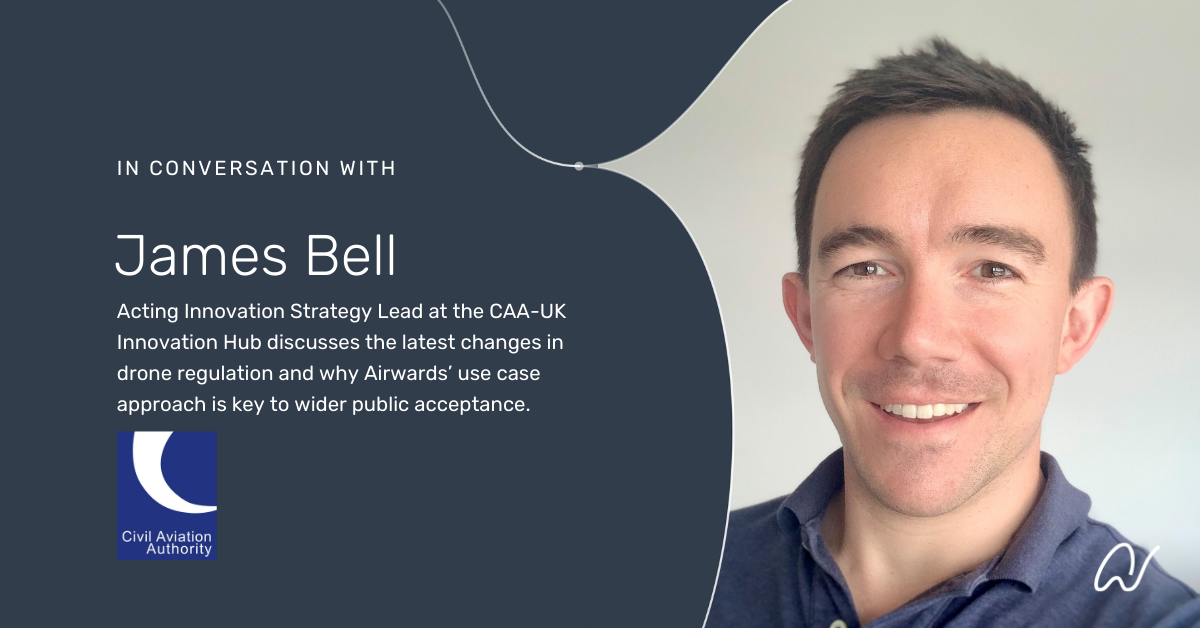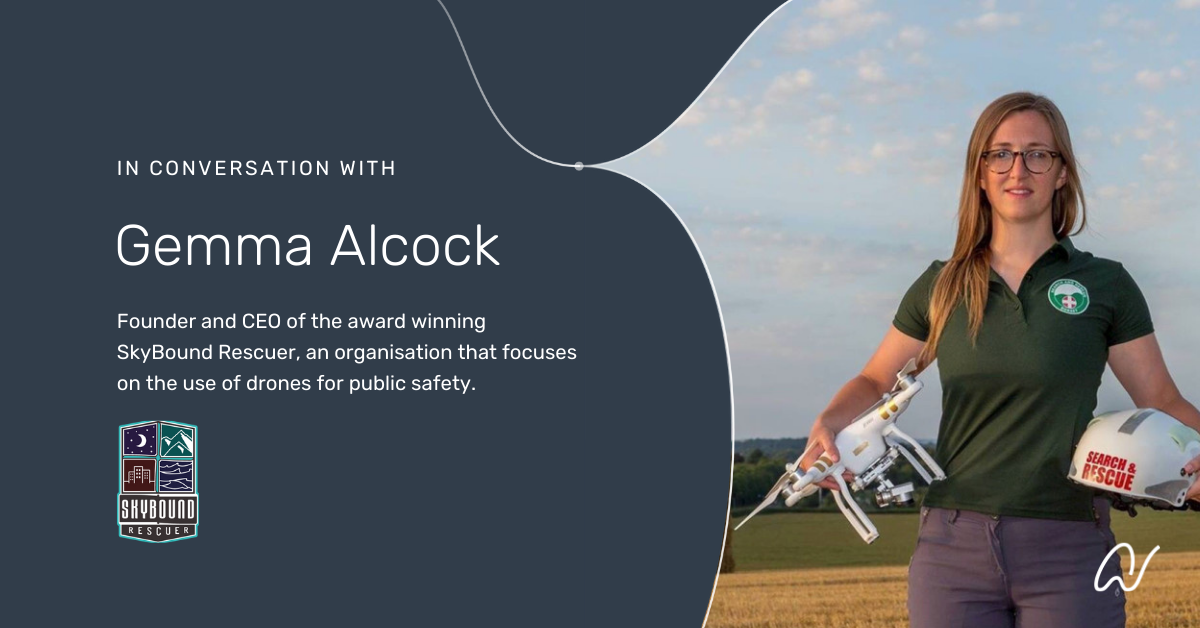In Conversation With
Each week, Airwards chats to someone in the drone industry doing incredible work. We uncover what they do, what makes them tick, where they see the drone industry headed, and discuss positive drone use.
In the very first of our blog series, In Conversation With, Airwards speaks with Graham Brown, CEO of drone trade association, ARPAS-UK. Graham shares insights into drone benefits, whether the future of drones will take away traditional jobs and what he says to anyone who is anti-drones...
ARPAS stands for the ‘Association of Remotely Piloted Aircraft Systems’. The not-for-profit trade association and professional body supports and acts on behalf of the remotely piloted aircraft (RPAS) community, from start-up businesses to larger established operations. Airwards is delighted to launch in association with ARPAS-UK, whose members continue to break new ground in markets where drones are delivering significant benefits.
1 | What is the role of ARPAS-UK and why is it needed?
As the trade association for the drone ecosystem, ARPAS-UK historically focused solely on drone operators. Today, our focus is on everyone involved in the drone industry - from manufacturers and software companies to anyone who uses drones commercially. That said, most of the opportunities and issues are related to aspects of drone operations.
We work closely with industry regulators, in particular the CAA (Civil Aviation Authority) and UK Government departments. On behalf of our members, we aim to influence and ensure that the regulatory framework for the safe and professional operation of remotely piloted aircraft is fit for purpose and encourages best practice.
The association works in the public interest and advocates professionalism within its membership through compliance and an agreed Code of Conduct. We take progressive stances on national issues to embed the drone profession in all end-user industries, to enable drones to continue to grow in reputation and influence.
2 | What do you see as the key benefits of drones?
Traditional uses of drones include filming (most films, tv shows and documentaries now have shots taken by drones) as well as data collection and inspection. Drones can collect data more accurately, quickly, cheaply and safely than ever before. What’s interesting is that drones are now the base for so much more than just a camera. The sensors you can put onto a drone hugely increase the scope and quality of the work being undertaken.
Firstly, there is LiDAR (Light Detection and Ranging). This remote sensing method uses light in the form of a pulsed laser to measure ranges (variable distances) to the Earth. Differences in laser return times and wavelengths can then be used to make digital 3D point cloud representations of the target. Secondly, there are thermal cameras, which are invaluable for search and rescue operations, firefighting and surveillance. Thirdly, multispectral cameras produce images used for evaluating soil productivity, analysing plant health and establishing different gases in the environment.
As I have already mentioned, from a human perspective, a real value of drones is the safety aspect - the fact they can perform tasks that are potentially dangerous for humans. With drones, you can avoid working at height, in a hazardous or restricted place, as well as a contaminated environment. This is relevant across so many different industries; construction, engineering, inspection, utility infrastructure, firefighting, security and the police sector to name a few. If you can carry out work in an infinitely safer manner, it’s just common sense to do so.
3 | What is next for drones?
Everyone is talking about small delivery drones, but there is much more going on that utilises drones across many different industries. A key question when looking at what is next for drones is not ‘if’, but ‘when’. Looking at a 10 to 15 year timeline, then unmanned cargo planes are next for the freight and transportation category. In other words, the delivery of goods of all sizes, which will of course lead to other things. Moving from freight to people, I again believe it’s not a matter of ‘if’, but ‘when’, drones will be transporting people.
The above is largely about changes and development in transportation, but another exciting opportunity over the next five years is the combination of robotics and drones. This merging will create ‘drones that do’ - drones that identify and then perform certain tasks. For instance, spraying or cleaning windows in the simplest form, as well as repairing things. So not only identifying a problem but making a permanent fix.
Project RISE - Unlocking the future of drone operations through integration.
4 | Should there be a concern that drones will take away jobs?
I don’t believe drones will take away jobs that weren’t already under threat. With change, there is always a shift in gears; an upshift and downshift. To clarify, as one set of human jobs disappears, another set will be created. PwC outlined this with their Skies without limits report, which indicated there could be 628,000 jobs in the drones economy by 2030. It is simply about adapting, just as we have all been doing throughout 2020 - and have actually been doing for centuries.
5 | What excites you about the drone industry?
Probably the fact there are more uses of drones than anyone ever originally conceived. You can identify problems faster and, more often, conduct preventive maintenance. Most importantly, you can inspect and intercept things before they go horrendously wrong.
Furthermore, drones are excellent for both repetitive jobs and responsive tasks, so the possibilities are endless. Take the security sector: rather than a security guard sitting in the freezing cold, drones can be kept in a box and deployed to deter thieves using a spotlight, alarm or camera. They can also conduct random perimeter patrols or respond to motion detectors set off in a particular section of a huge territory. Drones provide efficiency and coordination, and I think that has huge potential to drive business and create new jobs.
6 | What do you say to someone who is anti-drones?
I don’t think the public is generally ‘anti-drones’. In my view, it depends how and when you ask the question about drones. For example, if you asked someone what they thought of drones, right after a member of their family had been rescued, chances are they would give the thumbs up. As would the partner of someone who had been found semi-submerged using a drone’s thermal camera. As would anyone if you discussed NHS delivery trials, non-intrusive great barrier reef monitoring or the health analysis of whales by collecting their snot (using the quaintly termed ‘SnotBot’) - all activity successfully completed using drones.
However, ask the people whose holiday was disrupted by the suspected drones at Gatwick, and they would probably say drones are anything but positive. People may think drones are invasive and noisy. More often than not, people don’t understand what the drone is doing. For example, the drone above a field is no noisier than the farmer on a tractor. In fact, they are often a greener tool than existing options. So it is all about education. Once people know about the real use of drones and their incredible contribution, things change, but we need to do more to promote and communicate positive use cases beyond the drone industry.
Under 18s competition WODC - If you could design a drone to help with a problem in the World today, what would you design?
7 | What are you hoping Airwards will achieve?
Drones operate across a huge number of different industries. As a result, there is a lot of duplication with each industry trying to do its own positioning of drone use. The vital common thread is that drones are used well and safely in the roles they are being asked to do. Moreover, they are delivering accurate data faster than before whilst also saving us from dangerous jobs - saving companies millions in the process. In most cases, using drones is safer, faster, cheaper and greener. But there is not enough being done to use these business cases to educate both industry and the public.
In short, I am looking forward to Airwards doing just that: bringing the industry together and championing incredible examples of positive drone work, from a neutral position.
About Graham
Prior to ARPAS-UK, Graham has served as a director, CEO and Chairman of a wide range of international and British businesses in the technology, manufacturing, services, e-retail and financial services sectors, including an FCA regulated company and a public company on the London Stock Exchange. His breadth of experience includes businesses operating in the UK, Europe, North America and Asia Pacific markets. Growing up in the Middle East, Graham has lived in Germany, Singapore, and the USA. Graham has a BSc (Tech) Hons in Applied Psychology from the University of Wales, Cardiff.
Connect with Graham on LinkedIn and visit ARPAS-UK for more information.















